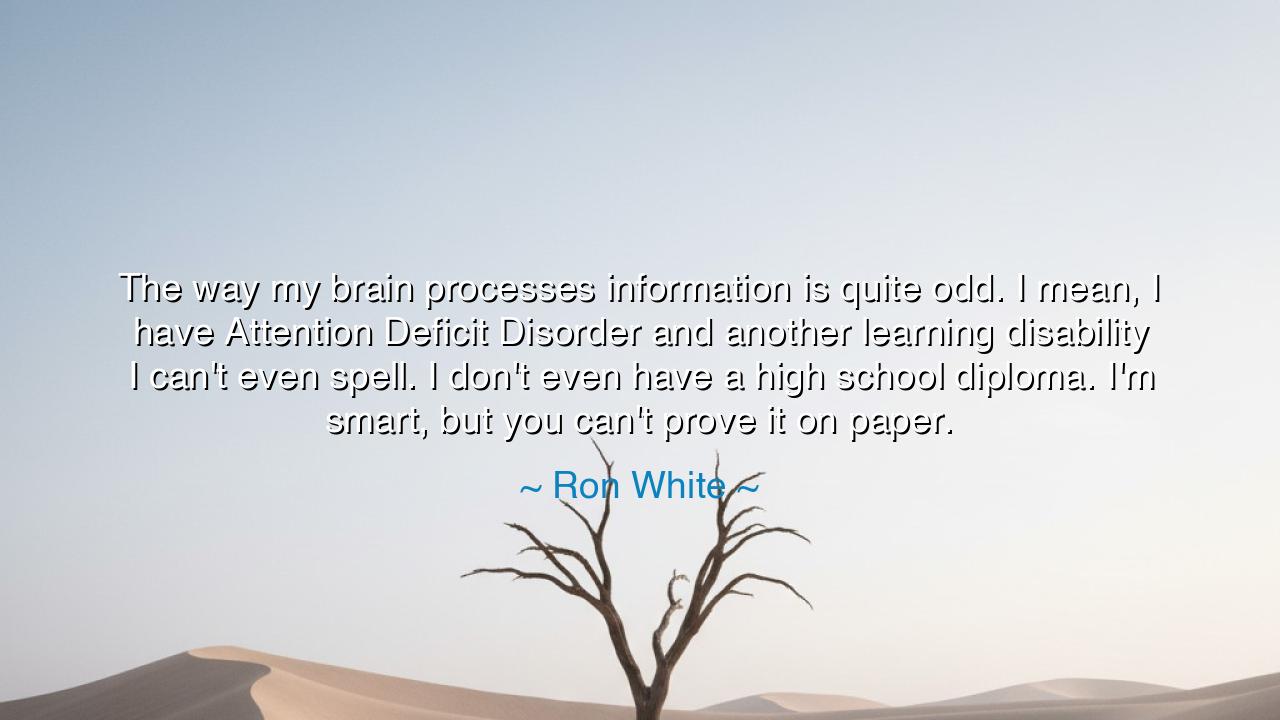
The way my brain processes information is quite odd. I mean, I
The way my brain processes information is quite odd. I mean, I have Attention Deficit Disorder and another learning disability I can't even spell. I don't even have a high school diploma. I'm smart, but you can't prove it on paper.






“The way my brain processes information is quite odd. I mean, I have Attention Deficit Disorder and another learning disability I can’t even spell. I don’t even have a high school diploma. I’m smart, but you can’t prove it on paper,” said Ron White, the humorist and philosopher of the stage whose laughter often concealed deep truths about the human spirit. Beneath his wit lies a profound lesson — that intelligence cannot be confined to the narrow walls of formal education, and that the spark of genius often burns brightest in those whom society has overlooked or misunderstood. His words echo through the ages as a defense of the unseen mind, the unmeasured gift, the brilliance that flows not through rules and tests, but through intuition, creativity, and raw perception.
When Ron White speaks of his mind as “odd,” he is not confessing weakness, but revealing the divine diversity of thought that dwells within humankind. The ancients knew that no two minds were shaped alike — that each person carried a unique rhythm of understanding. The philosopher Socrates never wrote down his teachings, yet his wisdom became immortal through dialogue. Leonardo da Vinci, who struggled with the conventions of Latin and mathematics, filled notebooks with dreams and inventions centuries ahead of his time. These were not men who fit the mold of their age; they were, like White, souls whose brilliance refused to be bound by structure. To have a “different” mind, then, is not to be broken, but to be tuned to another key — a key the world too often fails to hear.
White’s statement, “I’m smart, but you can’t prove it on paper,” strikes at the heart of modern folly — the belief that intelligence can be measured by credentials, diplomas, or test scores. This illusion has made many forget that true intellect is not a number, but a light — one that shines in problem-solving, storytelling, empathy, and imagination. A paper may record knowledge, but it cannot capture curiosity; it may confirm skill, but it cannot measure creativity. The wisest among us know that learning is not the same as schooling, and that the soul’s education is written not in ink, but in experience.
Consider the story of Thomas Edison, who was labeled “slow” by his teachers and expelled from school. His mother, believing in the fire she saw within him, taught him at home. From that “odd” mind came the electric light, the phonograph, and the motion picture — inventions that reshaped civilization. Edison’s story, like White’s, reminds us that the world’s progress often depends on those whose brilliance defies convention. Many of history’s great innovators were misjudged because their minds refused to travel the well-worn roads of thought. They stumbled through disorder, yet from that disorder came creation.
To live with a learning difference is to learn humility and resilience. It is to wrestle daily with the structures built for others and to carve one’s own path through misunderstanding. Yet from such struggle, a certain strength is born — the ability to see what others overlook, to think sideways, to connect where others separate. White’s humor — quick, sharp, and deeply observant — springs from that very gift. His “odd” brain, far from a burden, became the forge of his art. He teaches us that the so-called imperfections of the mind are often the fingerprints of genius, and that to understand differently is sometimes to understand more deeply.
But his words also carry a note of rebellion — a challenge to the world that judges worth through proof and paperwork. “You can’t prove it on paper,” he says, reminding us that the spirit defies certification. The greatest truths — love, imagination, insight — cannot be printed or graded; they must be lived. In a time obsessed with validation, his defiance becomes sacred. He invites us to value the unseen — the quiet intelligence of the craftsman, the intuition of the artist, the empathy of the healer, the wit of the storyteller. These are forms of wisdom the world cannot test, yet without them, civilization itself would crumble.
Thus, let this lesson be carried to all who have ever felt lesser because they did not fit the world’s measure: you are not defined by your papers, but by your potential. Nurture your curiosity. Honor your way of thinking, even if it wanders through unmarked paths. Be patient with your difference, for it may one day become your power. Learn not only from books, but from life itself — from failure, from laughter, from love.
So remember Ron White’s truth: that the mind’s worth cannot be proven by a diploma, nor its light dimmed by a label. The wise do not ask how a person learns, but what beauty their learning brings into the world. Each of us carries a unique spark of intelligence — some measured, others unseen — yet all part of the same divine fire. Do not bow to the paper that claims to define you. The soul’s brilliance needs no signature; it reveals itself only in the living.






AAdministratorAdministrator
Welcome, honored guests. Please leave a comment, we will respond soon